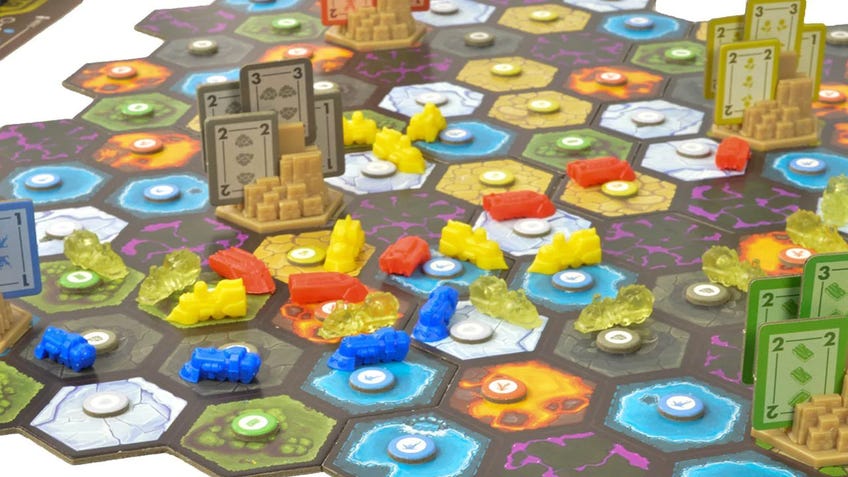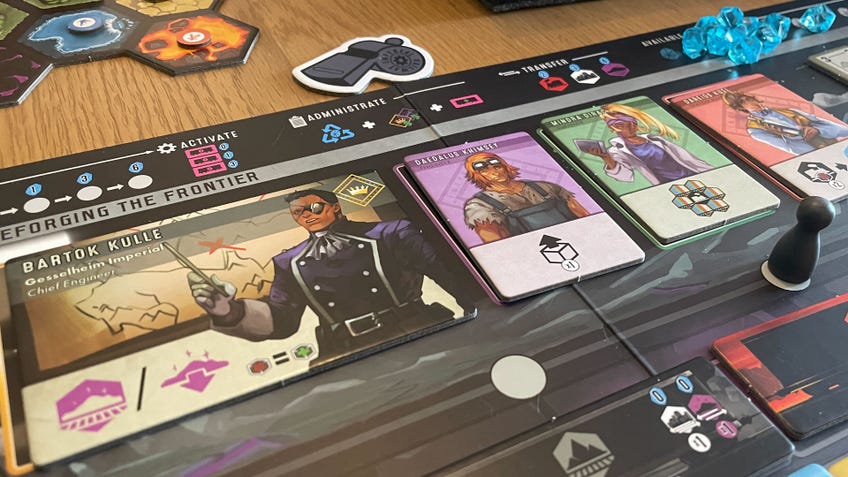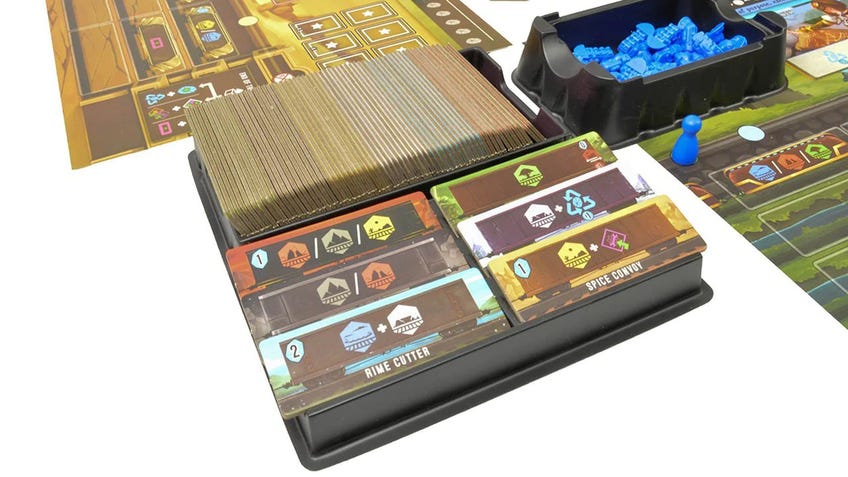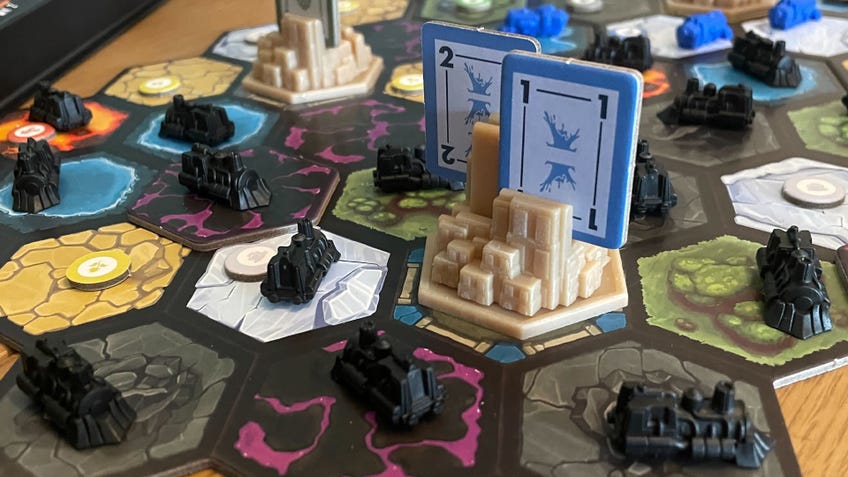Empyreal is the perfect train game for people who don’t like train games
One to choo-choo-choose.
If you’ve been reading Dicebreaker for any amount of time (thanks!), there are at least two things you might associate with me: train games and anime. Try not to hold it against me.
My love of both meet in Empyreal: Spells & Steam, the anime-styled train game from Level 99 - publisher of roundly excellent games like real-time bullet hell puzzler Bullet, TCG simulator Millennium Blades and the recent Dead by Daylight board game.
While I may be a fan of anime and train games, I accept that not many people fall into the middle of that particular Venn diagram. Here’s the good news, though: Empyreal is a great game about trains, without being tied to many of the things that might’ve put you off of the genre in the past. It looks sensational, is a blast to play, and might well surprise you compared to its first impression. Oh, and the anime element isn't too strong here either.

In Empyreal, players are competing railroad companies looking to expand their network of trains across a map, in order to deliver goods to different cities dotted about the land. It’s a pretty familiar setup, one that runs the gamut of classic train games from Ticket to Ride to Railways of the World.
Where Empyreal differs is in its very loose, forgiving approach to the ideas of network-building and pick-up-and-deliver gameplay. In its fantasy world (Indines, the shared universe home to other Level 99 games like Argent and BattleCon) trains are explicitly hovering magic vehicles powered by crystals, so they can easily hop over impassable terrain, opponents’ rails and cities without breaking their connection. This means you don’t have to form a connected line of carriages to deliver goods from your network; you simply need to have one train on the hex with the resource you’re picking up, and another next to the city that wants it.
Empyreal often feels more like the area-control fights of games like Blood Rage than the route-building of Ticket to Ride.
In such a way, Empyreal often feels more like the area-control fights of games like Blood Rage than the route-building of Ticket to Ride, as players speed their way to take control of hexes and whisk away their goods ahead of their rivals. Forming the longest contiguous route isn’t as important as simply getting where you need to be first, using every ability at your disposal to hoover up tokens and fulfil each city’s specific demand faster than your opponents in order to score the maximum number of points. Similarly, there’s no need to actually shuffle goods tokens along your network to deliver them; you can simply pick them off any hex you have a train on.

Those unique abilities are the real crux of Empyreal, with players needing to make use of their asymmetrical railroad company and the individual train crew and carriages they acquire to maximise their domination of the map. Like the clashing mismatched powers of Terra Mystica - cited as an inspiration by Empyreal designer Trey Chambers - each player’s company specialises in a differing play style; one might excel in blasting away hexes, replacing them with desolate wasteland to hinder opponents, while another might syphon goods from neighbouring hexes, stealing them away from rivals - or relocating their own goods around their network to keep them safe. It’s a delight seeing where those areas of competitive friction occur amidst the smooth motion of your own engine gathering speed.
As well as activating unique powers from their captain, engineer and other characters - which then need to be refreshed before being used again or, in some cases, are once per game only - each turn sees players able to activate a column of carriages on their individual folio, performing basic actions such as adding a train to an adjacent hex of a specific terrain type, shift goods around and add extra carriages to their board.
Where Empyreal keeps so much of its gameplay steaming along briskly with short, simple actions, the variety of possible powers across its character tiles and railcars allow the game to keep its wheels on the rails. While the iconography can be a lot to take in at first - expect to check the rulebook a bunch during your first couple of games - individual actions are straightforward, combining together in ways that make turns move quickly but provide a pleasing level of strategy. Performing extra actions during a turn costs crystals, which must be periodically refreshed along with characters by spending your turn on ‘administration’ rather than building track.
Importantly for a game about staying in constant motion ahead of your opponents, Empyreal moves quickly.
Actions are triggered by moving a conductor pawn along your columns of carriages, eventually hitting the end of the line on the far side of your board. This is where you’re able to scoop up goods tokens from your controlled hexes, delivering them to cities to claim demand tiles worth victory points; the more goods you deliver, the more points you get (as long as someone didn’t beat you to it). Once enough demand tokens are claimed or someone runs out of trains, points are counted up - with an optional set of ‘award’ objectives adding further bonuses and goals if you include them.

Most importantly for a game about staying in constant motion ahead of your opponents, Empyreal moves quickly. Its chunky cube box belies its snappy gameplay and setup, aided handily by one of the best box insets I’ve seen in any game. Player pieces, map boards and other components are stacked neatly inside, ready to be pulled out and played almost immediately - in the case of railcard tiles, the box insert doubles as a tray to display the marketplace as you play. While gameplay may not be quite as tight as the 20 minutes per player touted on the box - at least at first - you can still handily wrap up a match in under an hour or two depending on how many of you there are.
In a box closer to Gloomhaven than Railroad Ink in both size and price, this is a game that nevertheless skews towards offering a much lighter, approachable experience.
If there’s one eyebrow to be raised at Empyreal, in fact, it’s that its lavish level of overproduction - which includes unique train sculpts for each faction and translucent mana crystals, along with folding folios and dedicated trays for each player’s pieces - gives the impression of a much deeper, more intimidating game. That’s less a complaint than an observation. In a box closer to Gloomhaven than Railroad Ink in both size and price, this is a game that nevertheless skews towards offering a much lighter, approachable experience than you might expect, and requiring many more plays to simply get the same time-cost value out of it.
Even so, the ease of setting up, packing away and playing makes a return ticket far more inviting. Empyreal is a sumptuous production, bursting with personality between its unique named factions, characters, multitudinous powers and welcoming, exciting approach to what can sometimes seem a slightly stuffy genre. If train games are yet to really fire up your engine, Empyreal may well finally get things in motion.
Buy Empyreal: Spells & Steam directly from publisher Level 99 Games (US) or Zatu (UK).


